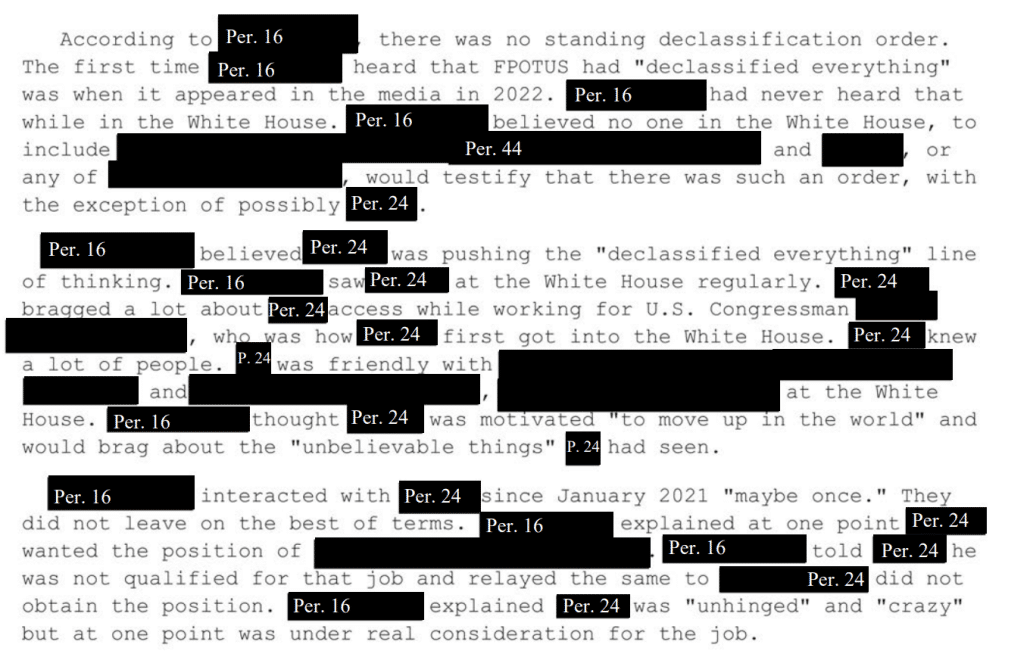Aileen Cannon Interfering with Chuck Grassley and Dick Durbin’s Constitutional Duty
I’m a bit baffled by the status of Aileen Cannon’s Calvinball to keep both volumes of the Jack Smith report buried (I thought her three day stay was up, but I must be wrong). But I fully expect she’ll find some basis to bigfoot her way into DOJ’s inherent authority again by the end of the day.
But this week, the result of her bigfooting poses new Constitutional problems. She is interfering with Chuck Grassley and Dick Durbin’s constitutional duty to advise and consent to Donald Trump’s nominees.
It’s not just me saying it. In the letter to Merrick Garland signed by aspiring Deputy Attorney General Todd Blanche and PADAG designee Emil Bove (whom WaPo says will serve as Acting DAG until Blanche is confirmed), complaining about the report, they state explicitly that release of the report would “interfere with upcoming confirmation hearings” (and, apparently, reveal damning new details about DOGE [sic] head Elon Musk’s efforts to interfere in a criminal investigation).
Equally problematic and inappropriate are the draft’s baseless attacks on other anticipated members of President Trump’s incoming administration, which are an obvious effort to interfere with upcoming confirmation hearings, and Smith’s pathetically transparent tirade about good-faith efforts by X to protect civil liberties, which in a myriad other contexts you have claimed are paramount.
This is premised on Smith’s report being biased.
Except what Cannon is suppressing consists of sworn testimony from some of Trump’s closest advisors. The damning testimony I keep raising, seemingly debunking Kash Patel’s claim (cited in search warrant affidavits) that Trump had “declassified everything” he took home with him almost certainly comes from Eric Herschmann, installed in the White House by Trump’s son-in-law Jared Kushner.
This witness names at least two other people who, he claimed, would corroborate his claim that Kash’s claims were false.
Another witness described that Kash visited Trump at Mar-a-Lago before he made his claim in Breitbart.
Most importantly, Kash himself provided compelled testimony to a grand jury, represented by Stan Woodward, who not only has been named as Senior Counselor in Trump’s White House, but who (in the guise of Walt Nauta’s attorney), remains on filings fighting to suppress the release of information that could harm Kash’s bid to be FBI Director.
Do Trump’s intended DOJ leadership think Kash’s own sworn testimony is unreliable?
Did Kash renege on his public claims that Trump declassified everything?
Or did he provide testimony that conflicts with that of multiple witnesses, in which case Jack Smith might have had to explain they would have charged Kash with obstruction, too, except that he testified with immunity.
Kash’s testimony (and that of the witness who appears to be Eric Herschmann) precedes the date of Jack Smith’s appointment. It cannot be covered by Aileen Cannon’s ruling that everything that happened after that was unconstitutional.
Trump’s nominee for FBI Director gave sworn testimony in an investigation into a violation of the Espionage Act. That testimony is almost certainly covered in Volume II of the Jack Smith report. Merrick Garland has described that he would allow Chuck Grassley and Dick Durbin (along with Jim Jordan and Jamie Raskin) to review the document — which is imperative for the ranking members of SJC to perform their duty to advise and consent to Trump’s appointments.
And Aileen Cannon has, thus far, said that Grassley and Durbin can’t do their job. They can’t consider Kash Patel’s conduct in an Espionage Act investigation in their review of Kash’s suitability to be FBI Director. The ranking members of the Senate Armed Services Committee have reviewed Pete Hegseth’s FBI background check, but Grassley and Durbin have been deprived of the ability to read about Kash Patel’s role in a criminal investigation into hoarding classified documents.
Durbin may well have standing to complain about Cannon’s interference in his constitutional duties. It’s high time he considered making the cost of Cannon’s interference clear.
Update: Steve Vladeck explains how I miscounted three “days:”
Under Federal Rule of Civil Procedure 6(a)(1)(C), when a court order gives a time period in days, we “include the last day of the period, but if the last day is a Saturday, Sunday, or legal holiday, the period continues to run until the end of the next day that is not a Saturday, Sunday, or legal holiday.” In other words, Cannon’s injunction, if it’s not modified, will expire (clearing the way for the public release of the January 6 volume) at the end of the day, today (and not, as many assumed, yesterday).
